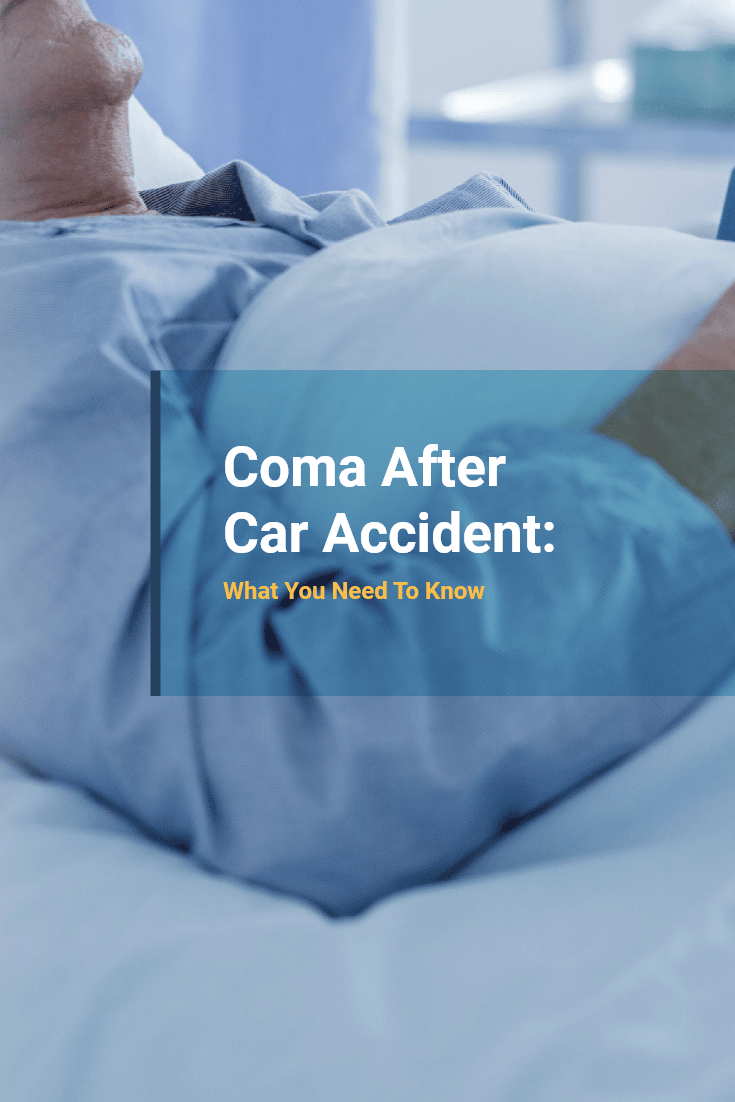Coma After Car Accident: What You Need To Know

A coma after a car accident is devastating both for the injured person and his or her family. Loved ones cannot communicate with the person who has been injured and neither can essential medical personnel. The survivor has important legal rights to medical care and pain and suffering compensation.
What is a coma?
A coma is a medical condition where a person experiences a sustained loss of consciousness due to trauma, pain, injuries or a combination of all three. The injured person cannot be woken up and does not respond to stimuli such as touch, sound and/or pain.
What to do for a coma after a car accident
If you suffered a coma after a car accident, follow these steps:
- Get examined immediately: Time may be of the essence. When it comes to properly diagnosing the cause of a coma after a car accident, the sooner a person gets the proper diagnostic tests and medical treatment for these symptoms, the sooner they can rule out a potentially life-threatening injury. As an injury lawyer, I always advise people that the sooner they can get the necessary and appropriate medical care, the sooner they can get back on the road to good health and a full recovery, but with this injury the key is to rule out a much more serious injury as soon as possible.
- Get medical treatment and get a referral for the appropriate diagnostic imaging to detect and diagnose if you have suffered from this medical condition. A doctor can’t treat you until he or she knows what is causing these symptoms, and the appropriate diagnostic testing – often a CT scan – will enable your doctor to prescribe the best course of treatment for you and make the appropriate referrals for you.
- Early documentation always makes it easier to avoid future problems with your own insurance company. Early medical documentation, such as in an emergency room or as soon as possible with your family doctor, will prove to a health insurance company or a No-Fault insurance company that the motor vehicle crash was the cause of your injury. If it does turn out to be a more serious injury, you’ve documented the early symptoms and again will be able to avoid many of the problems that arise when an insurance company is denying a causal relationship and refusing to pay for medical treatment. Early treatment and medical documentation create the temporal relationship that insurance companies will be looking for when they are being asked to pay for necessary medical care.
- Showing a clear temporal relationship between a motor vehicle collision and the documentation of treatment for a condition or injury also makes it easier to get a full and fair legal settlement for your injury when it is caused by another driver’s carelessness or negligence behind the wheel. Delays in seeking treatment hurt your ability to get better faster and make a good recovery, but it also often makes it harder for your attorney to get a reluctant insurance company to pay for your treatment and makes it harder to get a fair legal settlement after your crash.
- Don’t try to “tough it out”: a coma after a car accident may be a symptom of a far more serious injury that may even become fatal if you don’t seek treatment right away. As a lawyer, I’ve seen so many instances where people felt like they didn’t want to “complain,” but within days or weeks what they thought would be a minor injury or something that would go away becomes far more serious.
- Talk to an attorney who is experienced at helping people injured in motor vehicle crashes. Most experienced lawyers have helped people suffering from this medical condition after a motor vehicle crash. The initial call is always free so at the very least you will be informed as to what your insurance company is responsible to pay and what medical help and wage loss you are entitled to. An attorney can also help you review your medical records as well as the treatment and care you’re receiving to make sure bills are getting paid and they can use a car accident settlement calculator to help you assess what your case might be worth if your pain and disability was caused by another driver’s negligence or carelessness.
- Tell your auto insurance company about your coma after a car accident. If you live in Michigan, make sure to include this in your application for No-Fault benefits, which is also referred to as your “written notice of injury” – which must be given to your No-Fault auto insurance company “within 1 year after the accident.” (MCL 500.3145(1) and (4))
- Do not sign any settlements, releases, or waivers related to your collision: Until you have talked with an experienced attorney who is looking out for your interests, do not sign any settlements, releases, or waivers that are presented to you by your auto insurance company, the at-fault driver’s auto insurer or any other insurance companies or persons.
How to start a claim
In Michigan, you start your claim by filing an application for No-Fault benefits with the responsible auto insurance company, according to the No-Fault law’s “priority” rules. The No-Fault insurer will pay for your medical bills and your lost wages if you cannot return to work.
Can I sue for a coma after a car accident?
Yes. If your auto insurance company refuses to pay for – or cuts-off – No-Fault benefits related to this medical condition you have suffered, then you can sue for unpaid, overdue medical bills, attendant care, medical mileage, replacement services and lost wages because your injuries have prevented you from returning to work.
You can also sue the at-fault driver for pain and suffering compensation as a result of your crash-related injuries, but you will first have to show that the other driver was at-fault for causing the motor vehicle collision and that your mental trauma constitutes a “serious impairment of body function” under our auto law.
Additionally, you may be able to sue the at-fault driver for other economic damages, such as excess and future medical bills and lost wages.
What causes a coma after a car accident?
Frequently, a traumatic brain injury suffered as a result of a crash will cause a coma after a car accident. Additionally, a it may be medically induced when a victim is suffering excruciating pain and/or other medical issues exist that could worsen with the victim’s continued consciousness.
How long does a coma last after a car accident?
It varies with each victim. A coma after a car accident can last hours, days, weeks, months and even years.
Recovery
No one knows for sure when – and if – a person is going to emerge from this medical condition. Signs that a person may be coming out of one include being able to open his or her eyes, being able to respond to verbal commands and being able to move – no matter how slight the movement.
Sadly, the longer that it takes for a person to emerge from one, the less likely it is that the person will be able to recover and resume his or her normal life.
Survivors may endure lifelong symptoms, including, but not limited, to brain damage, paralysis, difficulty with both their fine and gross motor skills, challenges with communicating and an inability to perform basic, daily-life tasks. Frequently, survivors cannot resume work as they did prior to the collision.
Need help for a coma after a car accident? Call the attorneys at Michigan Auto Law
If you have suffered a coma after a car accident and would like to speak to an experienced injury attorney, call toll free anytime 24/7 at (800) 968-1001 for a free consultation with one of our attorneys. You can also get help from an experienced accident attorney by visiting our contact page or you can use the chat feature on our website.






